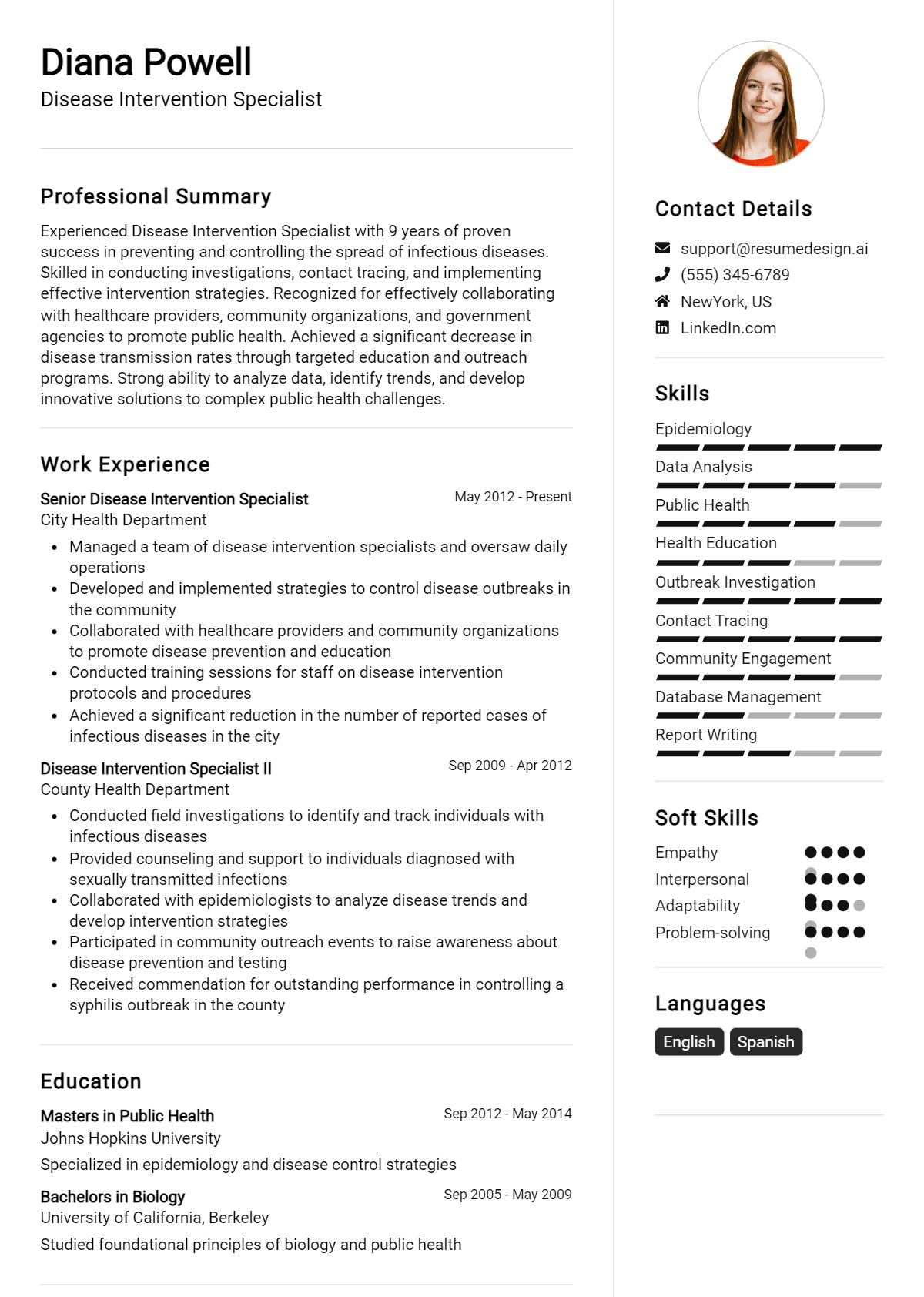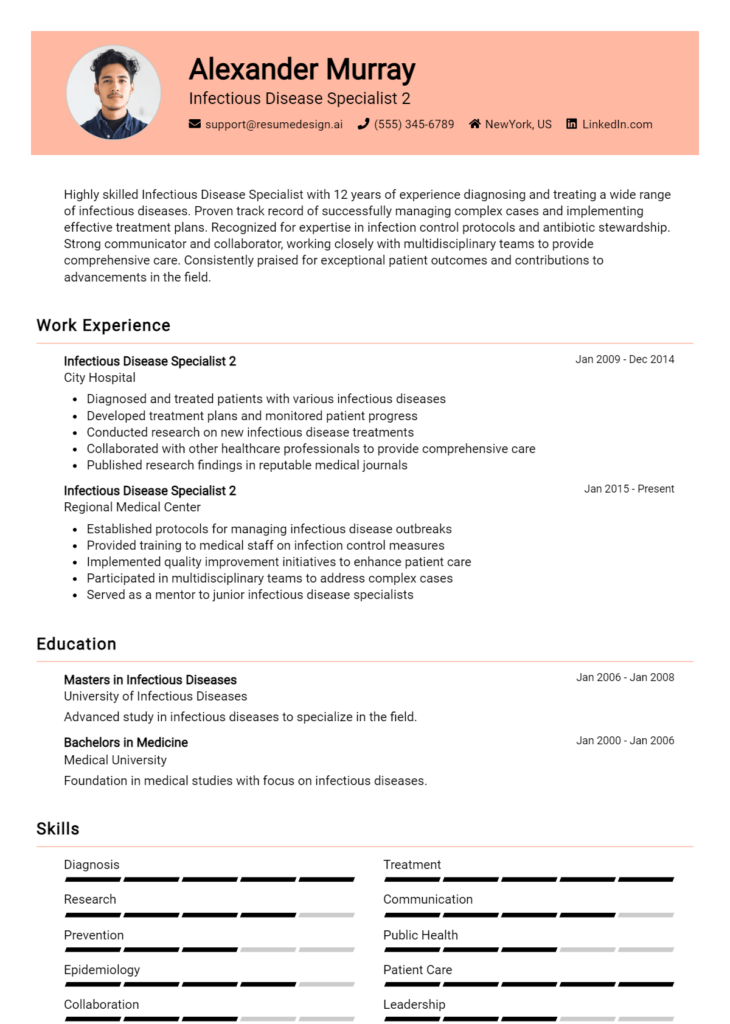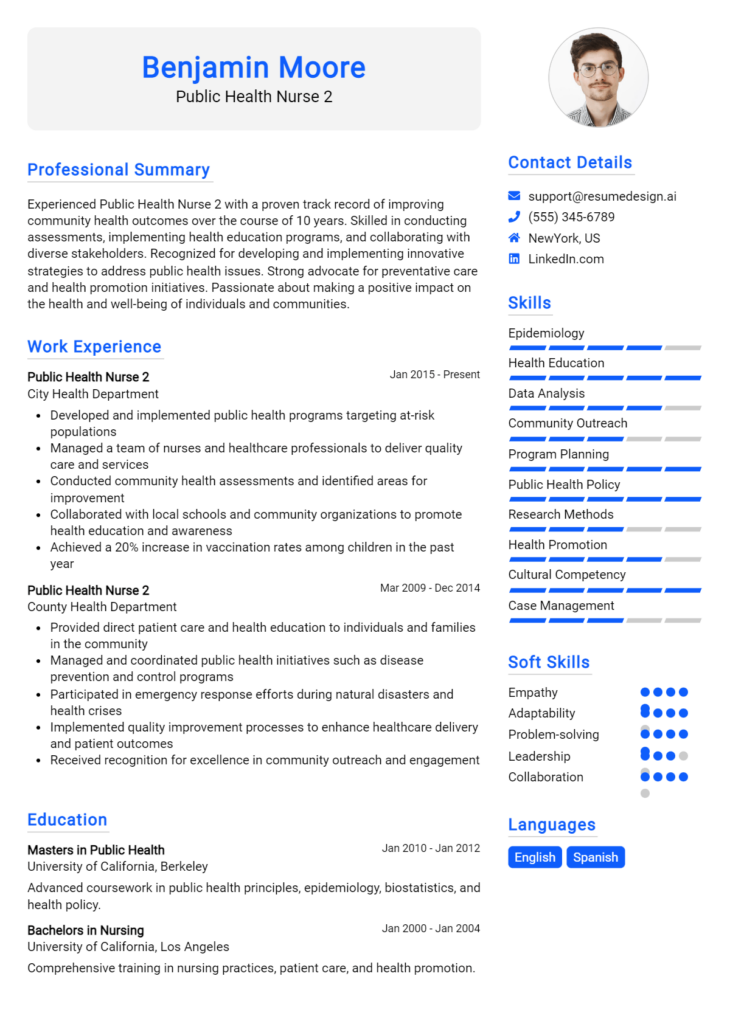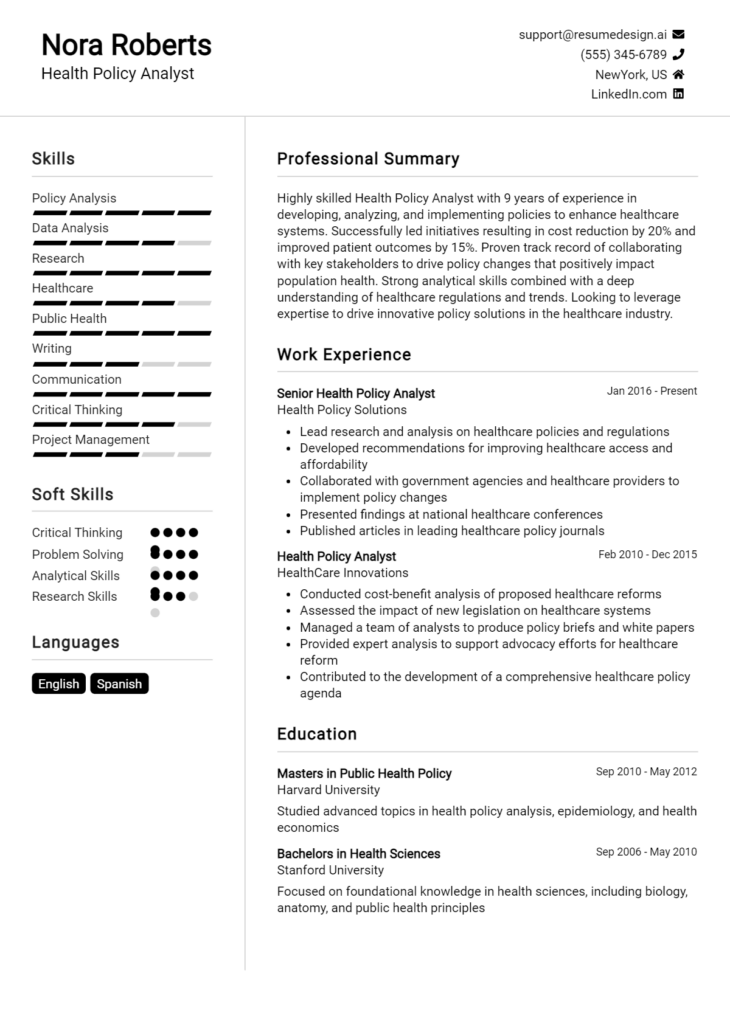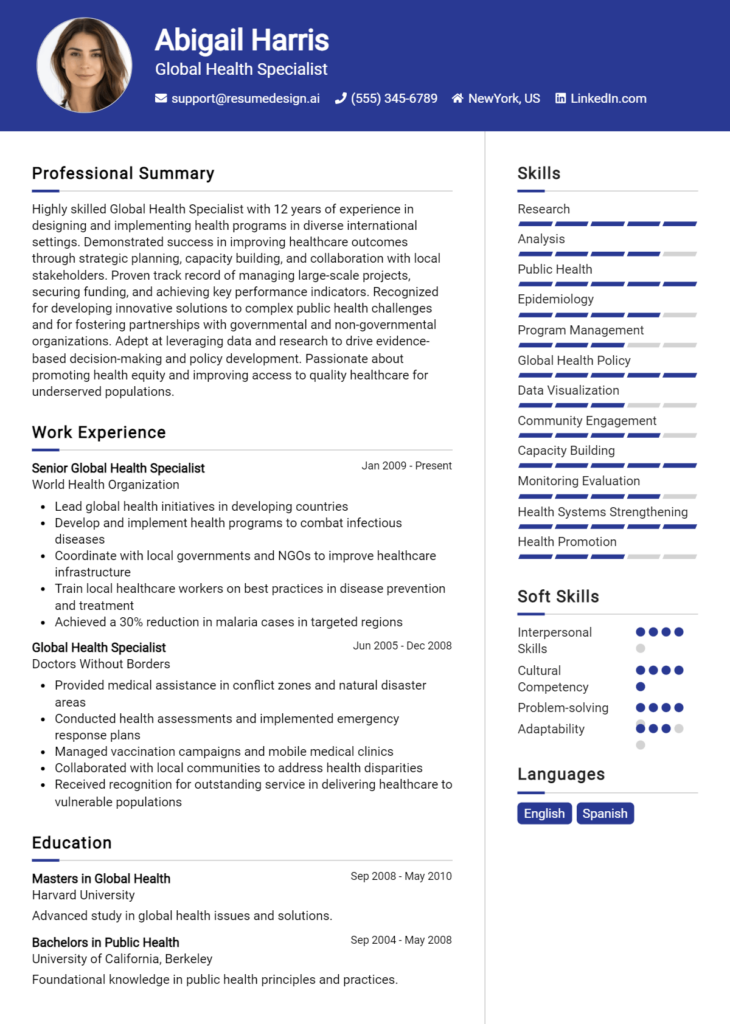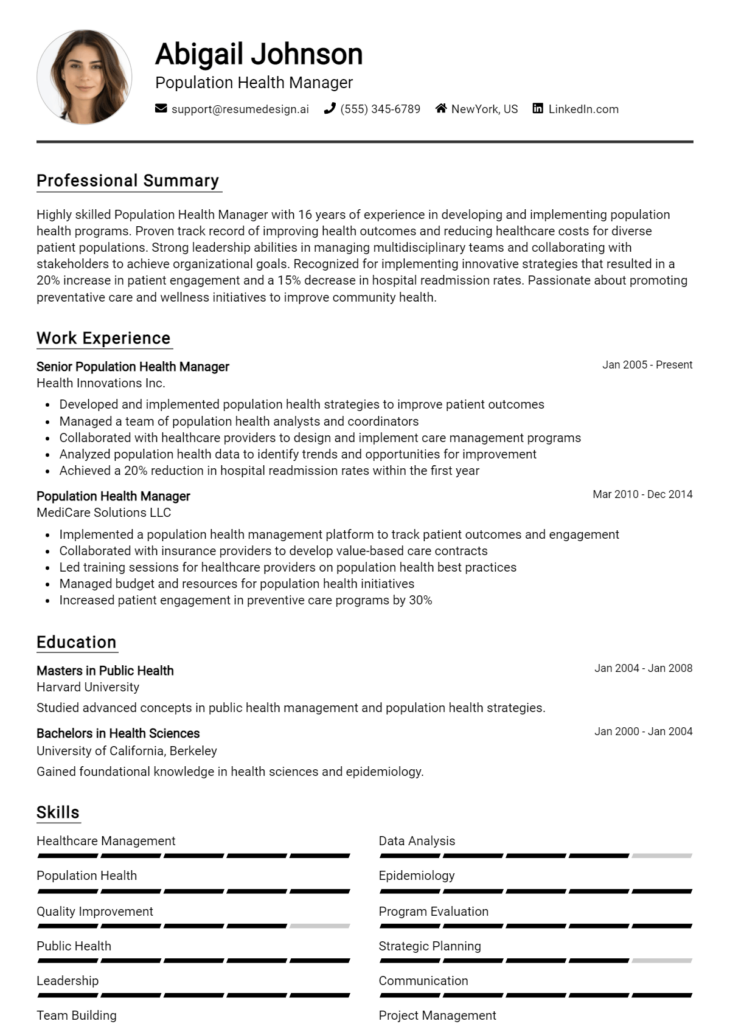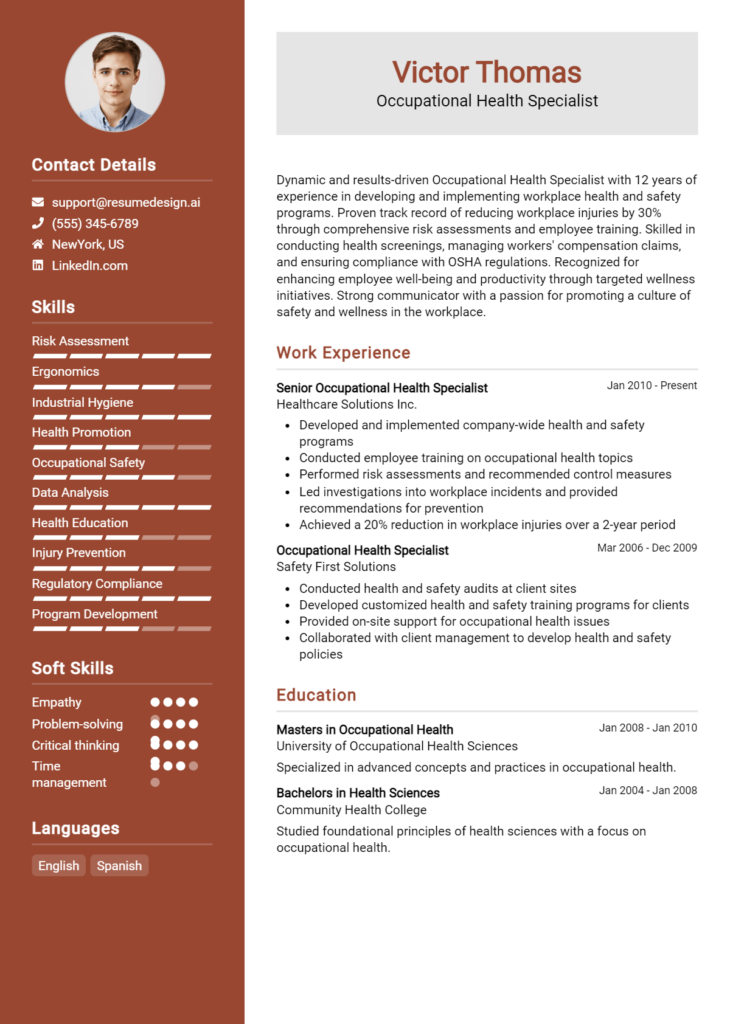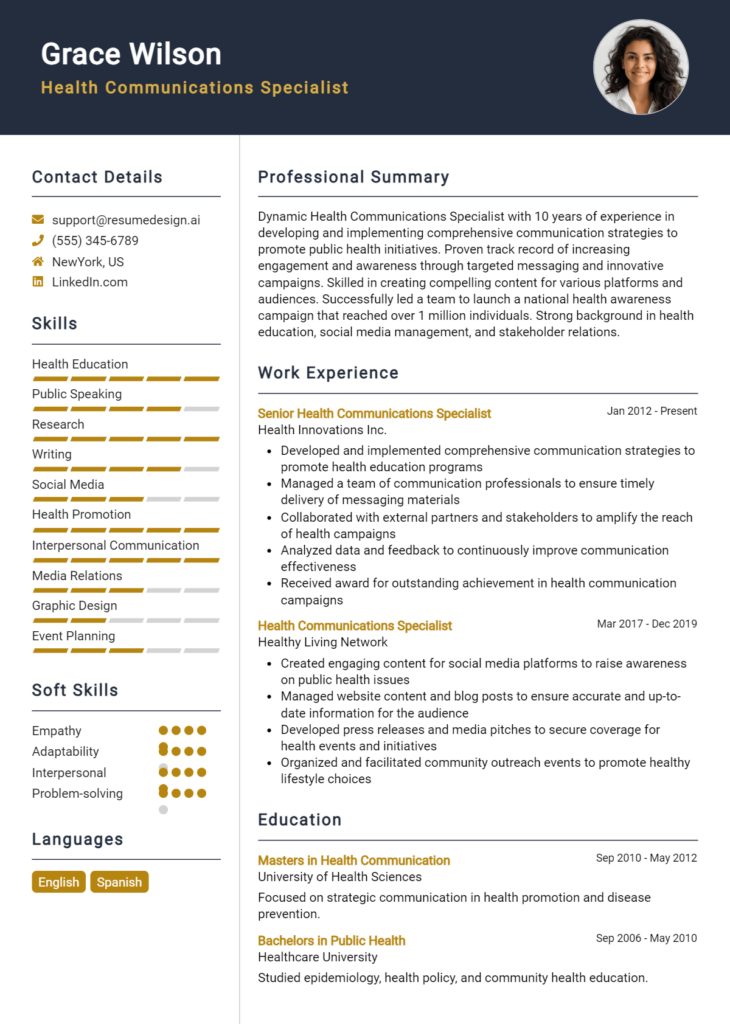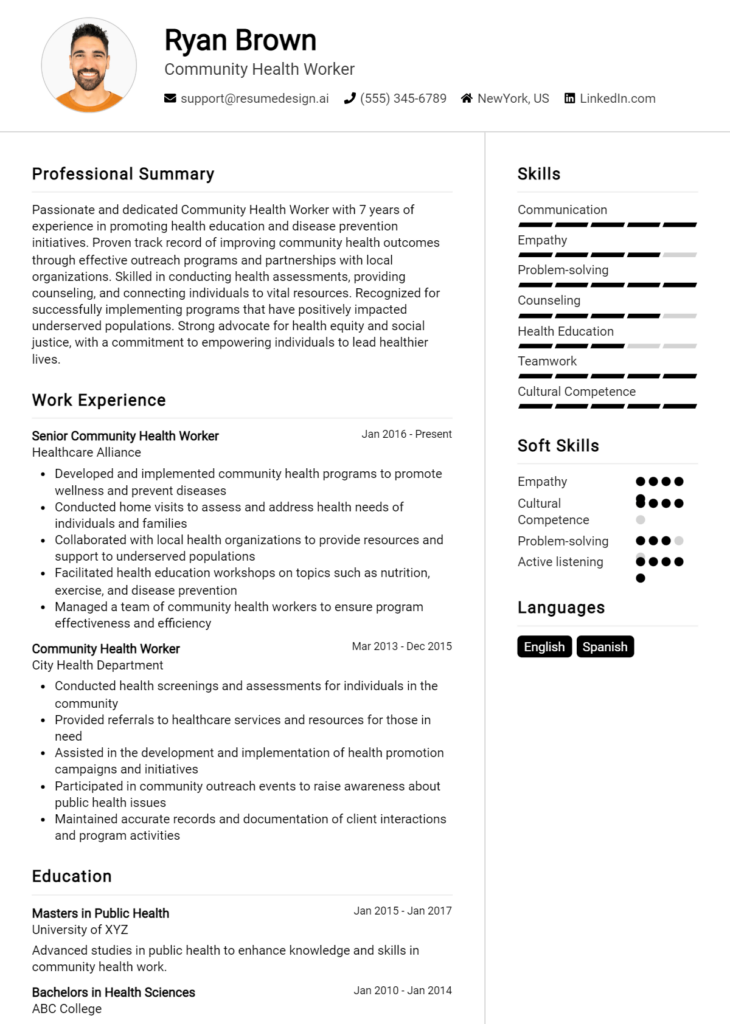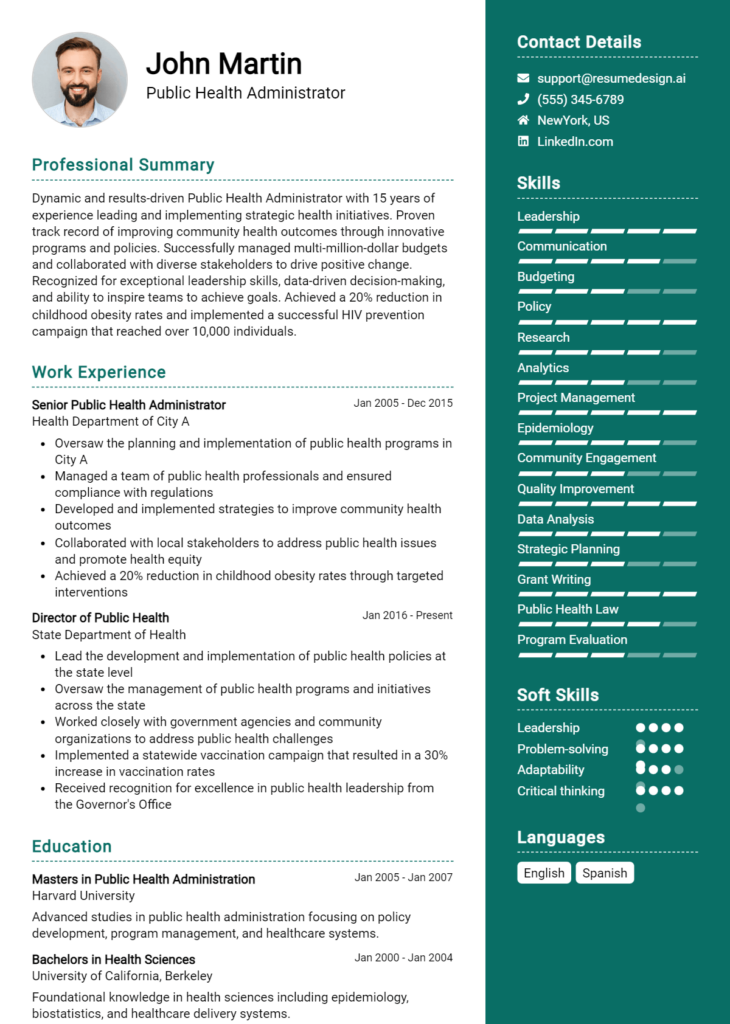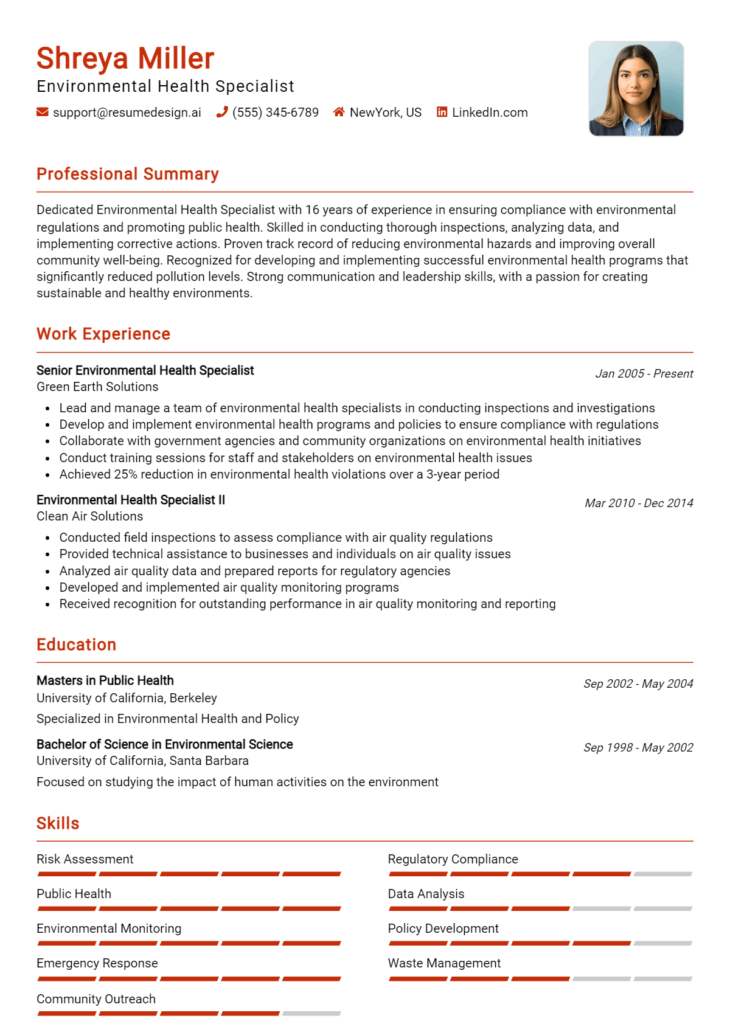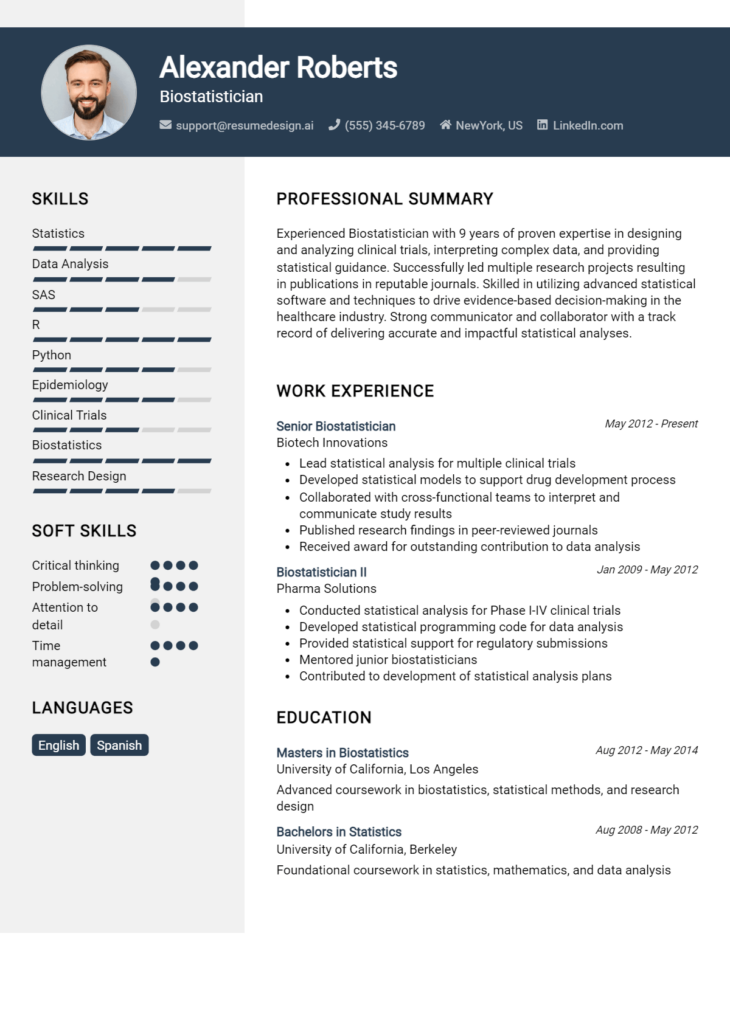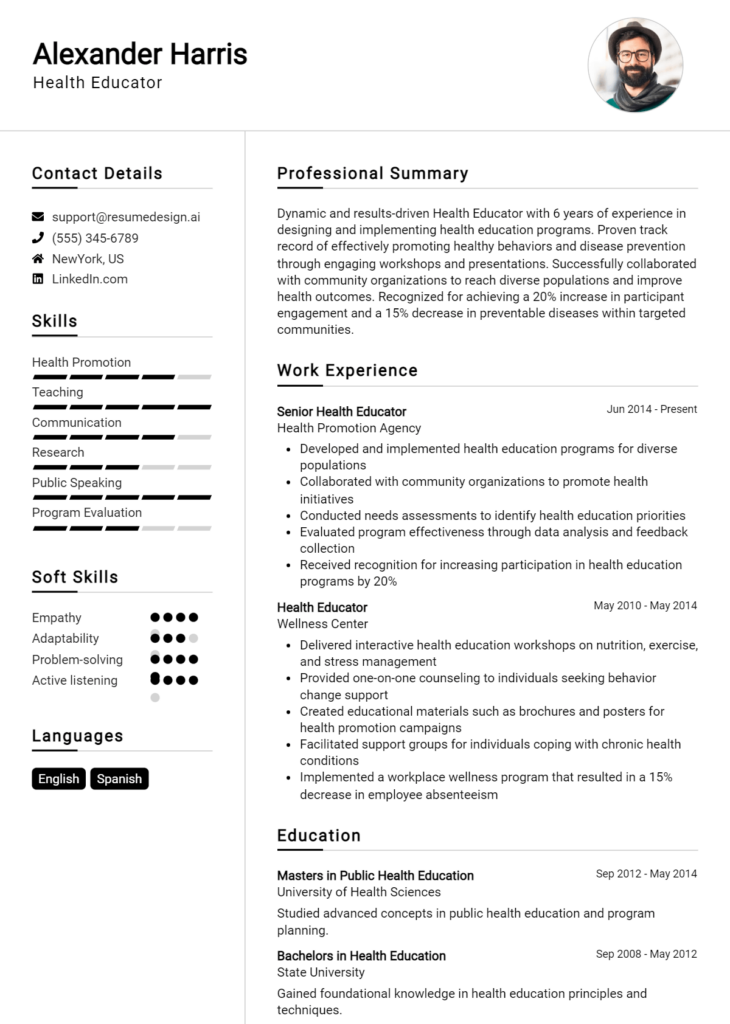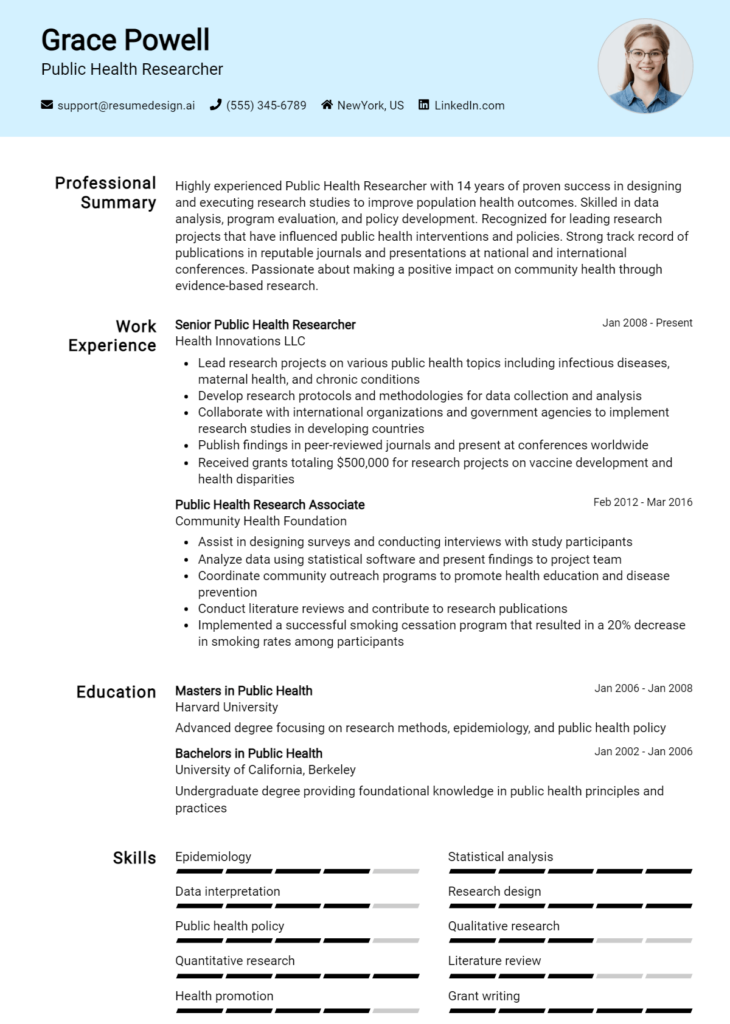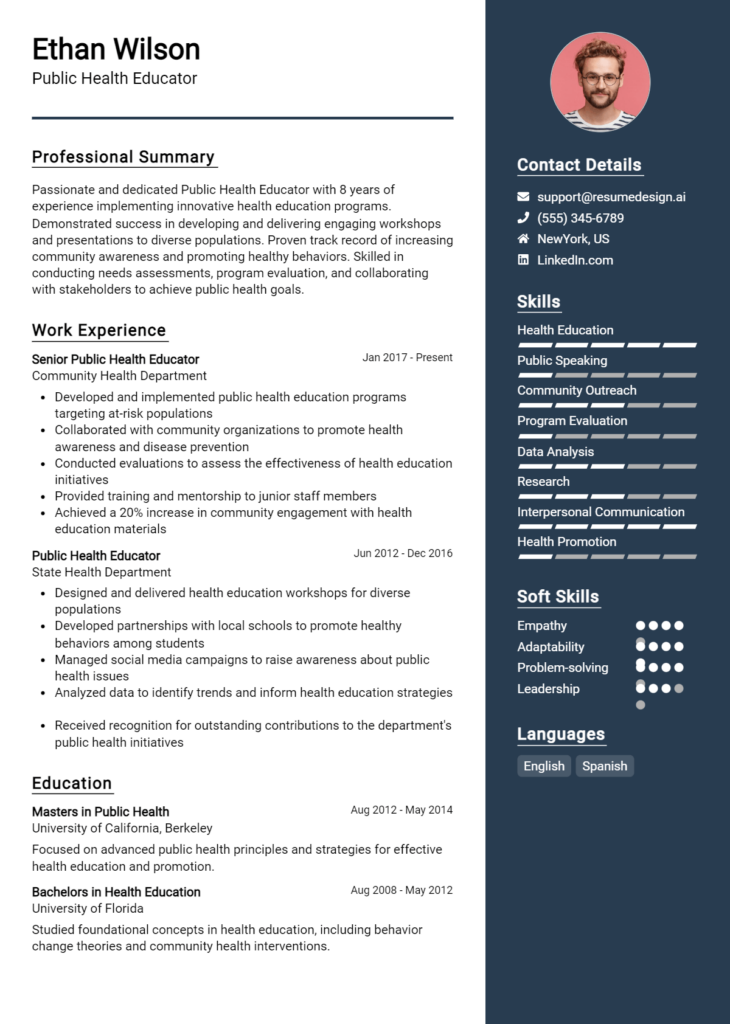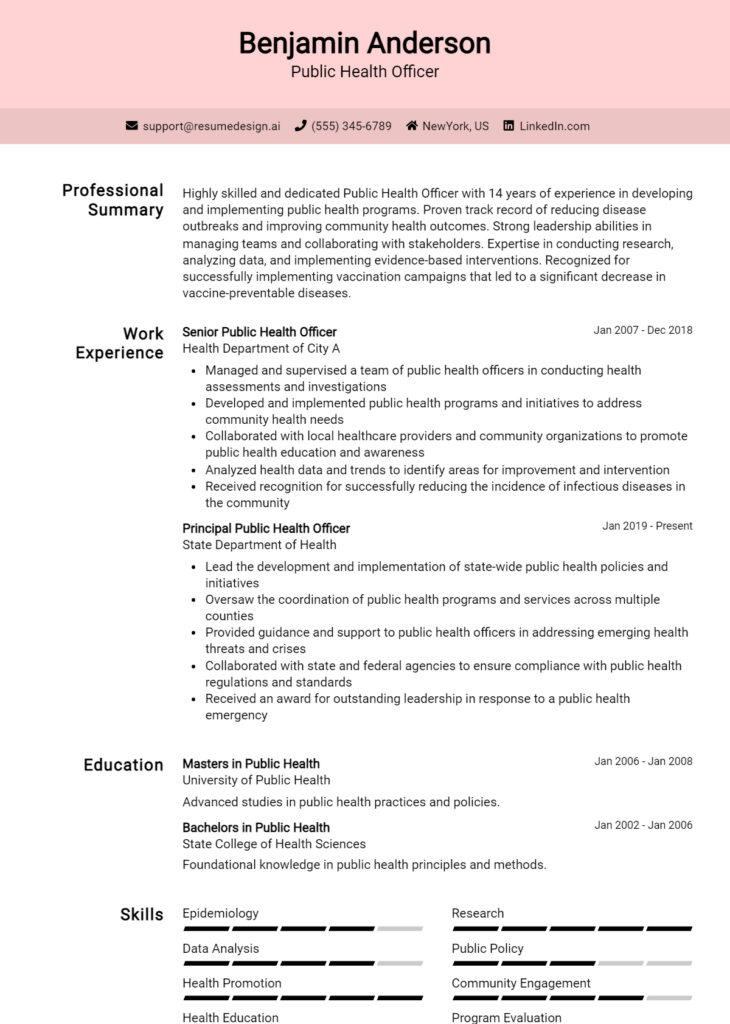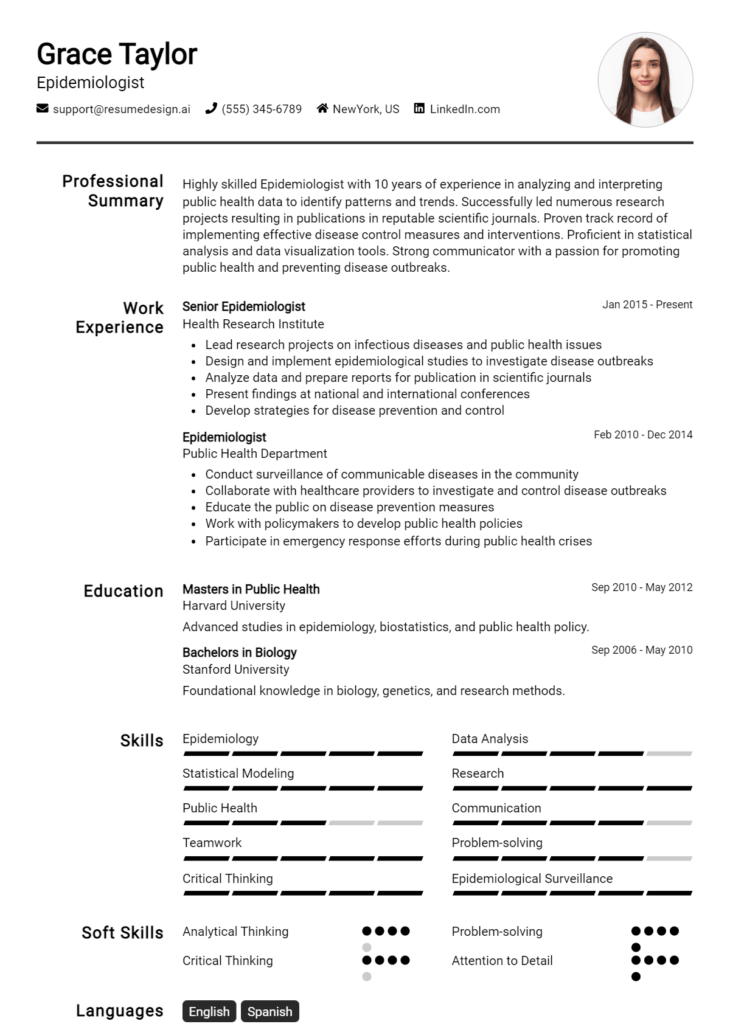Disease Intervention Specialist Core Responsibilities
A Disease Intervention Specialist plays a critical role in public health by bridging various departments, including epidemiology, outreach, and community health. Key responsibilities include conducting interviews, tracking disease outbreaks, and providing education on prevention strategies. Successful specialists must possess strong technical skills, operational expertise, and adept problem-solving abilities to address complex health issues effectively. These competencies contribute significantly to the organization’s goals of reducing disease transmission and improving community health outcomes. A well-structured resume can highlight these qualifications, showcasing the candidate's impact in the field.
Common Responsibilities Listed on Disease Intervention Specialist Resume
- Conducting confidential interviews with individuals to gather information on disease exposure.
- Tracking and monitoring disease outbreaks to identify trends and risks.
- Providing education and resources to affected individuals and communities.
- Collaborating with healthcare providers and community organizations.
- Developing and implementing intervention strategies for disease control.
- Maintaining accurate records and documentation of interventions.
- Analyzing data to assess the effectiveness of disease prevention efforts.
- Participating in outreach activities to promote public health initiatives.
- Staying updated on best practices in disease intervention and public health.
- Training and mentoring new staff or volunteers in intervention techniques.
- Responding to public inquiries regarding disease information and prevention.
High-Level Resume Tips for Disease Intervention Specialist Professionals
A well-crafted resume is essential for Disease Intervention Specialist professionals, as it often serves as the first impression made on potential employers. In a field where detail-oriented candidates are sought after, your resume must effectively reflect not only the skills you possess but also the achievements that set you apart from other applicants. A strong resume can communicate your ability to manage complex situations, engage with diverse populations, and contribute to public health goals. This guide will provide practical and actionable tips specifically tailored for Disease Intervention Specialist professionals to help you create a compelling resume that stands out in the competitive job market.
Top Resume Tips for Disease Intervention Specialist Professionals
- Tailor your resume to the job description by incorporating relevant keywords and phrases that match the qualifications sought by employers.
- Highlight your relevant experience in disease intervention, public health, or similar roles, detailing specific responsibilities and outcomes.
- Quantify your achievements where possible, such as the number of cases managed or the percentage of successful interventions, to provide concrete evidence of your impact.
- Showcase your industry-specific skills, including knowledge of epidemiology, contact tracing, and community outreach techniques.
- Include certifications and training relevant to disease intervention, such as those from public health organizations or specialized workshops.
- Utilize a clean and professional format that enhances readability and focuses attention on your most important qualifications.
- Incorporate a summary statement at the beginning of your resume that succinctly captures your experience and career goals.
- Demonstrate your ability to work collaboratively with healthcare teams, showcasing examples of successful partnerships or initiatives.
- Emphasize your communication skills, both verbal and written, as these are crucial in conveying public health messages effectively.
By implementing these tips, you can significantly increase your chances of landing a job in the Disease Intervention Specialist field. A well-structured and targeted resume will not only highlight your qualifications but also demonstrate your commitment to public health, making you an appealing candidate to potential employers.
Why Resume Headlines & Titles are Important for Disease Intervention Specialist
In the competitive field of healthcare, particularly as a Disease Intervention Specialist, a well-crafted resume headline or title is critical. A strong headline can instantly capture the attention of hiring managers, offering them a succinct snapshot of a candidate's essential qualifications and suitability for the role. It serves as the first impression, and when done effectively, it can highlight key skills, relevant experience, and professional achievements in a single impactful phrase. Therefore, creating a concise and relevant headline that aligns directly with the job being applied for is essential to stand out in a crowded applicant pool.
Best Practices for Crafting Resume Headlines for Disease Intervention Specialist
- Keep it concise: Aim for a headline that is no longer than 10-12 words.
- Be role-specific: Tailor your headline to reflect the specific role of a Disease Intervention Specialist.
- Highlight key skills: Incorporate relevant skills that are highly sought after in the field.
- Include certifications: Mention any certifications or qualifications that enhance your candidacy.
- Use action verbs: Start with strong action verbs that convey your accomplishments and impact.
- Focus on results: If possible, quantify achievements to demonstrate effectiveness and outcomes.
- Match the job description: Use keywords from the job posting to align your headline with the employer's needs.
- Stay professional: Maintain a formal tone and avoid overly casual language or jargon.
Example Resume Headlines for Disease Intervention Specialist
Strong Resume Headlines
Dedicated Disease Intervention Specialist with 5+ Years of Experience in Public Health
Certified Disease Intervention Specialist Skilled in Contact Tracing and Community Outreach
Results-Driven Public Health Professional with Proven Success in Disease Prevention Strategies
Experienced Infection Control Specialist Committed to Enhancing Community Health Outcomes
Weak Resume Headlines
Healthcare Worker
Looking for a Job in Disease Intervention
Experienced Professional
The strong headlines are effective because they clearly communicate the candidate's specific expertise and achievements, making them immediately relevant to the role of a Disease Intervention Specialist. They employ industry-specific language and focus on key qualifications that matter most to hiring managers. In contrast, the weak headlines lack specificity and fail to convey any concrete qualifications or relevance to the position, making them forgettable and ineffective in grabbing attention. A strong headline not only piques interest but also sets the tone for the rest of the resume, creating a compelling narrative of the candidate’s professional journey.
Writing an Exceptional Disease Intervention Specialist Resume Summary
A well-crafted resume summary is crucial for a Disease Intervention Specialist, as it serves as the first impression for hiring managers. This brief introductory paragraph allows candidates to highlight their most relevant skills, experiences, and accomplishments quickly. A strong summary can effectively capture attention by emphasizing key qualifications that align with the job requirements, ensuring that the candidate stands out in a competitive job market. It should be concise, impactful, and specifically tailored to the role being applied for, enhancing the candidate's chances of securing an interview.
Best Practices for Writing a Disease Intervention Specialist Resume Summary
- Keep it concise: Aim for 2-4 sentences that provide a snapshot of your qualifications.
- Quantify achievements: Use specific numbers or outcomes to illustrate your impact.
- Highlight relevant skills: Focus on skills that are directly applicable to the Disease Intervention Specialist role.
- Use action verbs: Start sentences with powerful action verbs to convey confidence and proactivity.
- Tailor for the job: Customize your summary to reflect the specific requirements and language of the job description.
- Showcase soft skills: Include interpersonal skills that are critical for effective communication and collaboration.
- Be specific: Avoid vague statements; instead, provide details that demonstrate your unique qualifications.
- Maintain a professional tone: Ensure that your summary reflects professionalism and a commitment to public health.
Example Disease Intervention Specialist Resume Summaries
Strong Resume Summaries
Dedicated Disease Intervention Specialist with over 5 years of experience in identifying and mitigating public health threats. Successfully reduced disease transmission rates by 30% in underserved communities through targeted outreach and education initiatives.
Results-driven public health professional skilled in contact tracing and epidemiology. Managed a team that successfully traced over 500 COVID-19 cases, leading to a 25% increase in community awareness and a 15% decrease in new infections.
Compassionate Disease Intervention Specialist with a proven track record of collaborating with local health departments to implement effective disease prevention programs. Achieved a 40% increase in vaccination rates through strategic community engagement and educational workshops.
Weak Resume Summaries
Experienced in public health and disease intervention. I have worked in various roles and can handle many tasks related to the job.
Looking for a position as a Disease Intervention Specialist where I can use my skills and experience to help with health issues.
The examples of strong resume summaries are considered effective because they include specific metrics, relevant skills, and clear outcomes that demonstrate the candidate's impact in previous roles. They focus on quantifiable achievements and are tailored to the responsibilities of a Disease Intervention Specialist. In contrast, the weak resume summaries lack specificity and measurable results, making them less compelling and memorable to potential employers.
Work Experience Section for Disease Intervention Specialist Resume
The work experience section of a Disease Intervention Specialist resume is critical as it serves as a platform to demonstrate the candidate's relevant skills and achievements. It highlights not only the technical expertise necessary for disease intervention but also the ability to effectively manage teams and deliver high-quality outcomes in public health initiatives. By quantifying accomplishments and aligning experiences with industry standards, candidates can present a compelling narrative that showcases their impact in the field, making their application stand out to potential employers.
Best Practices for Disease Intervention Specialist Work Experience
- Use specific metrics to quantify your achievements (e.g., percentage of cases successfully managed).
- Highlight technical skills relevant to disease intervention, such as data analysis and epidemiological methods.
- Showcase collaboration efforts with public health teams and community partners.
- Detail leadership roles and responsibilities in team settings to illustrate management capabilities.
- Focus on results-driven experiences that demonstrate your contribution to public health outcomes.
- Keep descriptions concise and relevant to the position you are applying for.
- Utilize action verbs to convey a sense of proactivity and effectiveness in your role.
- Align your experiences with the specific requirements outlined in the job description.
Example Work Experiences for Disease Intervention Specialist
Strong Experiences
- Successfully led a team of 10 in implementing a community-wide vaccination campaign, resulting in a 30% increase in immunization rates over six months.
- Conducted over 200 contact tracing interviews, identifying and mitigating potential disease outbreaks, which contributed to a 15% decrease in new infection rates.
- Developed and executed a data analysis project that improved reporting accuracy by 25%, enhancing the department's response strategy for infectious disease control.
- Collaborated with local health departments and NGOs to establish a resource network that provided education and support to over 1,000 residents during an outbreak.
Weak Experiences
- Assisted with health programs in the community.
- Participated in meetings regarding public health issues.
- Helped with data entry for disease cases.
- Worked on various projects related to health education.
The examples listed as strong experiences are considered effective because they provide specific, quantifiable outcomes and illustrate clear leadership and collaboration, showcasing the candidate’s direct impact on public health initiatives. In contrast, the weak experiences lack detail and do not convey significant achievements or specific contributions, making them less compelling to potential employers.
Education and Certifications Section for Disease Intervention Specialist Resume
The education and certifications section of a Disease Intervention Specialist resume is crucial as it showcases the candidate's academic achievements, relevant certifications, and commitment to ongoing professional development. This section not only highlights the foundational knowledge gained through formal education but also emphasizes industry-recognized certifications that validate the candidate's skills and expertise. By including relevant coursework and any specialized training, candidates can enhance their credibility and demonstrate their alignment with the expectations of the role, making them more appealing to potential employers.
Best Practices for Disease Intervention Specialist Education and Certifications
- Include only relevant degrees and certifications that align with the job requirements.
- Detail any specialized training programs that enhance your qualifications for the role.
- List certifications in order of relevance and importance, prioritizing industry-recognized credentials.
- Provide descriptions of relevant coursework that directly pertains to disease intervention or public health.
- Highlight ongoing education efforts, such as workshops or online courses that keep skills current.
- Ensure all certifications are up to date, reflecting the latest standards in the field.
- Consider including a short summary of your educational philosophy or commitment to lifelong learning.
- Use clear and concise language to make this section easily scannable for hiring managers.
Example Education and Certifications for Disease Intervention Specialist
Strong Examples
- Master of Public Health (MPH), University of California, Berkeley, 2021
- Certified Health Education Specialist (CHES), National Commission for Health Education Credentialing, 2022
- Bachelor of Science in Biology, University of Florida, 2018
- Training in Epidemiology, Centers for Disease Control and Prevention (CDC), 2023
Weak Examples
- Associate Degree in Culinary Arts, Community College, 2015
- Certification in Microsoft Office, Online Course, 2019
- High School Diploma, Local High School, 2014
- Outdated CPR Certification, Expired 2021
The examples listed as strong are considered relevant because they directly relate to the field of public health and disease intervention, showcasing the candidate's qualifications and specialized training. In contrast, the weak examples do not align with the core responsibilities of a Disease Intervention Specialist, indicating a lack of relevant education and certifications that would support the applicant's suitability for the role.
Top Skills & Keywords for Disease Intervention Specialist Resume
As a Disease Intervention Specialist, the ability to effectively communicate, analyze, and manage sensitive health information is paramount. Your resume serves as a first impression to potential employers, and showcasing the right skills can significantly enhance your candidacy. Emphasizing both hard and soft skills not only reflects your technical capabilities but also your interpersonal qualities, which are crucial in this role. Tailoring your resume to highlight these skills can demonstrate your readiness to engage with communities, conduct investigations, and implement interventions that promote public health. For more insights on how to effectively outline your skills, visit our skills page.
Top Hard & Soft Skills for Disease Intervention Specialist
Soft Skills
- Communication Skills
- Empathy
- Problem-Solving
- Active Listening
- Cultural Competence
- Team Collaboration
- Adaptability
- Attention to Detail
- Conflict Resolution
- Critical Thinking
- Relationship Building
- Time Management
- Emotional Intelligence
- Motivational Skills
Hard Skills
- Knowledge of Epidemiology
- Data Analysis and Interpretation
- Disease Surveillance Techniques
- Public Health Informatics
- Case Management
- Risk Assessment
- Familiarity with Health Regulations
- Statistical Software Proficiency
- Geographic Information Systems (GIS)
- Report Writing
- Laboratory Techniques
- Knowledge of Infectious Diseases
- Proficiency in Microsoft Office Suite
- Training and Development Skills
- Crisis Intervention Techniques
For further guidance on presenting your work experience, make sure to incorporate both your hard and soft skills in context to your professional journey.
Stand Out with a Winning Disease Intervention Specialist Cover Letter
Dear [Hiring Manager's Name],
I am writing to express my interest in the Disease Intervention Specialist position at [Company/Organization Name] as advertised on [where you found the job posting]. With a strong background in public health and extensive experience in disease prevention and control, I am confident in my ability to contribute effectively to your team. My passion for community health, coupled with my skills in communication and data analysis, aligns perfectly with the requirements of this role.
In my previous role at [Previous Company/Organization Name], I successfully implemented targeted intervention strategies that resulted in a significant reduction in the transmission of communicable diseases within underserved populations. By conducting thorough interviews and facilitating confidential discussions, I was able to gather critical information that informed our public health initiatives. My ability to collaborate with healthcare providers and community organizations has proven essential in creating effective outreach programs, ensuring that individuals receive the education and resources needed to make informed health decisions.
Additionally, my proficiency in utilizing data management systems and analyzing epidemiological trends allows me to identify high-risk areas and populations. I am adept at developing and delivering educational materials tailored to diverse audiences, ensuring that health messaging is both accessible and impactful. I am particularly drawn to [Company/Organization Name] because of its commitment to innovative public health solutions and community engagement, and I am eager to contribute my expertise to further these goals.
Thank you for considering my application. I look forward to the opportunity to discuss how my skills and experiences align with the needs of your team. I am excited about the possibility of working together to improve public health outcomes and make a meaningful difference in the community.
Sincerely,
[Your Name]
[Your Contact Information]
Common Mistakes to Avoid in a Disease Intervention Specialist Resume
When crafting a resume for a Disease Intervention Specialist position, it's crucial to present your skills and experiences effectively to stand out in a competitive field. However, many candidates make common mistakes that can diminish their chances of securing an interview. Understanding these pitfalls can help you create a more compelling and professional resume that highlights your qualifications and experiences. Here are some common mistakes to avoid:
Generic Objective Statements: Using a one-size-fits-all objective can make your resume feel impersonal. Tailor your objective to reflect your passion for public health and specific interest in disease intervention.
Neglecting Relevant Experience: Failing to emphasize relevant experiences, such as previous public health roles, internships, or volunteer work, can undermine your qualifications. Ensure that your experience in disease prevention and intervention is highlighted prominently.
Ignoring Quantifiable Achievements: Listing duties without showcasing measurable outcomes can weaken your impact. Include statistics or outcomes, such as the number of cases managed or improvements in community health metrics.
Overly Complex Language: Using jargon or overly technical language can alienate the reader. Aim for clarity and simplicity to ensure your skills and experiences are easily understood by hiring managers.
Lack of Keywords: Not incorporating industry-specific keywords can cause your resume to be overlooked during applicant tracking system (ATS) scans. Carefully read the job description and include relevant terms that fit your experience.
Poor Formatting: A cluttered or unprofessional format can detract from your qualifications. Use a clean, organized layout with clear headings and bullet points to enhance readability.
Omitting Continuing Education: Failing to mention any ongoing education, certifications, or training related to disease intervention can signal a lack of commitment to professional development. Always include relevant courses or certifications.
Ignoring Cover Letter Integration: Not referencing your cover letter in your resume can lead to missed opportunities for connection. Consider how both documents can complement each other to provide a fuller picture of your qualifications and passion for the role.
Conclusion
As a Disease Intervention Specialist, your role is critical in controlling the spread of infectious diseases and promoting public health. Throughout this article, we discussed the essential skills required for this position, such as effective communication, analytical thinking, and the ability to work collaboratively with healthcare providers and community organizations. We also highlighted the importance of staying updated with the latest public health policies and practices to ensure effective intervention strategies.
In light of these key points, it's essential to ensure that your resume reflects your qualifications and experiences in the best possible light. A well-structured resume can significantly enhance your job application, making you stand out in a competitive field.
We encourage you to take a moment to review your Disease Intervention Specialist resume. To assist you in this process, you can access an array of resources, including resume templates, which can provide a professional layout; a resume builder, designed to streamline the creation of your resume; resume examples to inspire your content; and cover letter templates that will help you craft a compelling introduction to your application.
Take the initiative today to refine your resume and position yourself as a strong candidate in the field of disease intervention!

